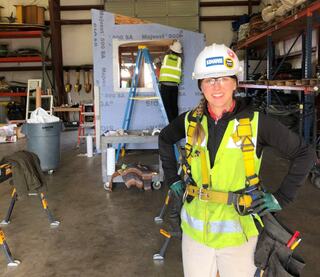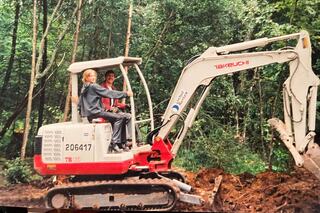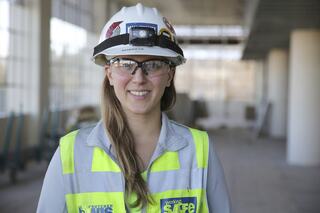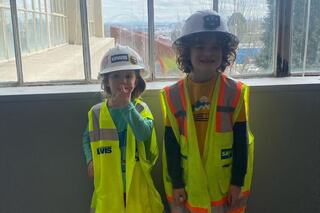WIC Week Profile: Estimator Sharaya Hays

As a high schooler on summer break in her hometown of Anchorage, Alaska, it wasn’t unusual to find Sharaya Hays laying on the grass in her backyard, sketching houses and floor plans on graph paper. She was sure she’d be an architect.
Her passion for design could be traced to her dad, Cam, who owned a solo residential contracting business. In the summertime, she’d tag along to see the homes he was renovating. Eventually she started helping out, installing Trex decking, building masonry retaining walls and painting interior walls.
It was only after majoring in architecture at Washington State University that she had a change of heart.
“I vowed before graduating I’d never be an architect,” Sharaya says, even though she did still graduate with the degree.
Instead, she went to work as a field engineer for a large national general contractor in Portland. The company asked her to commit to one of two career tracts within six months of joining: project manager or superintendent. She opted for the latter.
In addition to her field-engineering duties, she attended carpenters union classes and logged hours as a carpenter’s apprentice. Five years later, after journeying out with the same general contractor, she felt she was being pressured back into an office role. What made her such a valuable contributor—her comfort level with technology—became the reason she was being pulled out of the field.
“They weren’t listening to what my goals were,” Sharaya recalls. “They were doing what made more financial success for them, which in this case, was me switching to the project manager path.”
She decided to part ways with the company and took an 18-month break after her second child was born. She joined Lewis in the summer of 2018 as a project engineer with the company’ preconstruction department, deciding it would be beneficial to learn how projects are shaped on the front end.
One day, while interviewing a job candidate with Lewis director of operations Robert Jepsen, Sharaya mentioned that she’d always seen Lewis as her ‘unicorn’ company and that she wanted to be back in a field role someday. That caught Robert’s attention.
“After that meeting, Robert pulled me aside and said, ‘You’re the [real] unicorn!’” Sharaya remembers.
Robert helped Sharaya transition into her second role at Lewis: as a foreman working in Lewis’ corporate market sector (formerly the special projects team).
As a high schooler on summer break in her hometown of Anchorage, Alaska, it wasn’t unusual to find Sharaya Hays laying on the grass in her backyard, sketching houses and floor plans on graph paper. She was sure she’d be an architect.
Her passion for design could be traced to her dad, Cam, who owned a solo residential contracting business. In the summertime, she’d tag along to see the homes he was renovating. Eventually she started helping out, installing Trex decking, building masonry retaining walls and painting interior walls.
It was only after majoring in architecture at Washington State University that she had a change of heart.
“I vowed before graduating I’d never be an architect,” Sharaya says, even though she did still graduate with the degree.
Instead, she went to work as a field engineer for a large national general contractor in Portland. The company asked her to commit to one of two career tracts within six months of joining: project manager or superintendent. She opted for the latter.
In addition to her field-engineering duties, she attended carpenters union classes and logged hours as a carpenter’s apprentice. Five years later, after journeying out with the same general contractor, she felt she was being pressured back into an office role. What made her such a valuable contributor—her comfort level with technology—became the reason she was being pulled out of the field.
“They weren’t listening to what my goals were,” Sharaya recalls. “They were doing what made more financial success for them, which in this case, was me switching to the project manager path.”
She decided to part ways with the company and took an 18-month break after her second child was born. She joined Lewis in the summer of 2018 as a project engineer with the company’ preconstruction department, deciding it would be beneficial to learn how projects are shaped on the front end.
One day, while interviewing a job candidate with Lewis director of operations Robert Jepsen, Sharaya mentioned that she’d always seen Lewis as her ‘unicorn’ company and that she wanted to be back in a field role someday. That caught Robert’s attention.
“After that meeting, Robert pulled me aside and said, ‘You’re the [real] unicorn!’” Sharaya remembers.
Robert helped Sharaya transition into her second role at Lewis: as a foreman working in Lewis’ corporate market sector (formerly the special projects team).

Sharaya Hays would spend summer breaks on her dad’s jobsites. Here, they pose on a small excavator in 2004.
Finding her voice
That led to her managing several corporate market projects before taking on her largest assignment yet in 2021: a multifamily residential project already in progress. Lewis had inherited the job from another contractor. It encompassed four three-story buildings, one leasing office and 80 workers from non-union subcontractors.
On any given job, foremen manage subcontractors and fill any gaps in the field. In addition to supervising project work, Sharaya found herself placing and stripping the blocking for gypcrete placement on the ground floor of each building, placing fire caulking, checking on personnel, coordinating deliveries, communicating/confirming design changes in the field and answering questions.
The environment she first encountered was less than ideal. There were only a handful of other women on the project; the field folks were not respectful to the job site; and the mask-wearing mandates were getting lots of work pushback.
“I was coming there as a young female,” Sharaya says. “Some of the subcontractors gave me the feeling of, ‘Oh, you want us to listen to you?’”
She credits Monica Conly, the project manager, and now-retired superintendent Mick Eckard for helping her establish credibility and find her voice.
“You listen to her now,” Mike told crews during an early safety meeting. “Anything she says, I agree with. If you have questions, don’t ask me. Ask her.”
“That was what I really needed” Sharaya said. “To find my authority. To find my confidence.”
Although bumpy at first, Sharaya believes the experience allowed her to discover one of her core strengths as a foreman: “I soften people.”
She noticed that many of the workers on the job were used to being yelled at on past projects. Inevitably, they would respond by being closed off. Sometimes they’d stonewall others. Sharaya became their sounding board.
“People would complain to me,” she remembers. “And I would say, ‘Yeah, that really sucks. I would hate that too.’ After they would vent, we would discuss how to move forward. There were a lot of handshake agreements, deals made on the fly, to get stuff done and feel better about doing it.”
One of the lessons she learned along the way was the importance of leaning into her own strengths, personality, and unique ways of thinking instead of trying to conform to what people might expect of a woman in a male-dominated field.

Sharaya credits her colleagues for helping her navigate some of the more challenging stages of her construction career.
Three generations of builders
In April 2022, she embarked on her third role at Lewis: estimator. As a mother of two, she attributes Lewis’ culture with helping her maintain a healthy work-life balance. She’s also benefitted from the support of her three managers, each of whom have taken the time to understand her career goals.
Sharaya’s passion for construction is wearing off on her two young children.
They’re both regulars at Sharaya’s jobsite and relish any chance they get to wear Lewis safety gear. Her son, Asher has already taken an interest in learning building fundamentals from an established teacher: Sharaya’s dad.
*Throughout Women in Construction Week 2024, we’ll be highlighting the stories of women from across Lewis who are making a difference in the industry. Follow along on the Lewis blog and social media (LinkedIn, Instagram, and Facebook) all week for more. *

Sharaya’s children, Reagan and Asher, pose for a photo at Lewis’ Avangrid project.